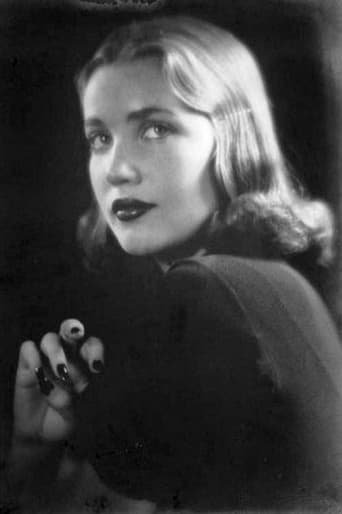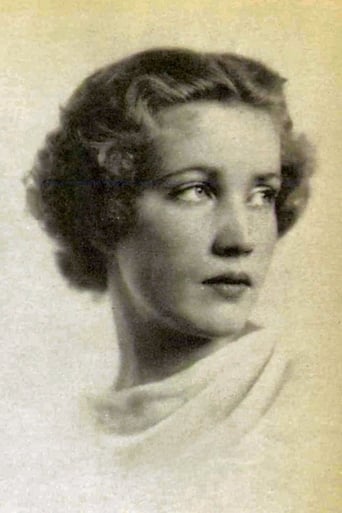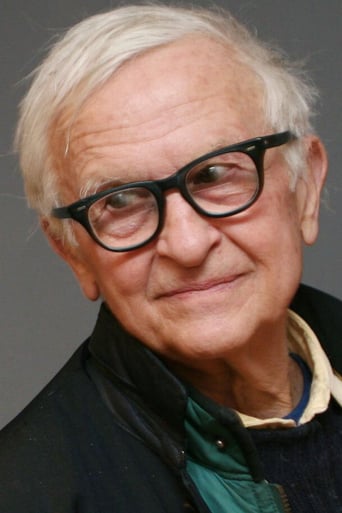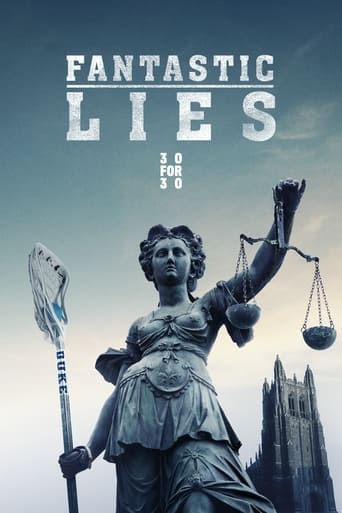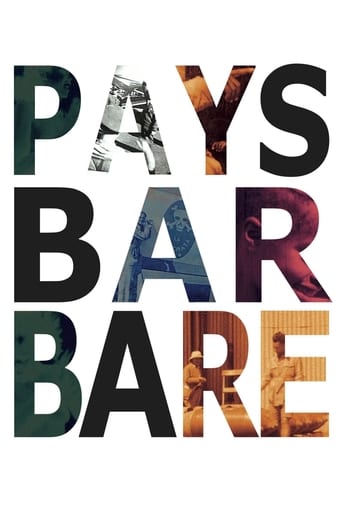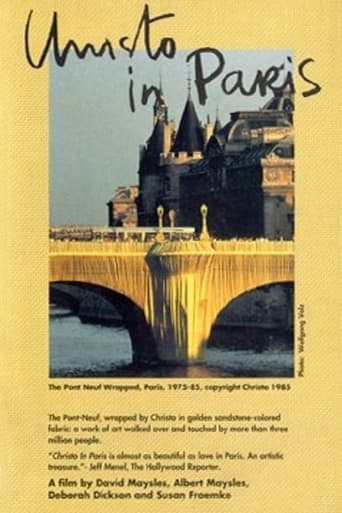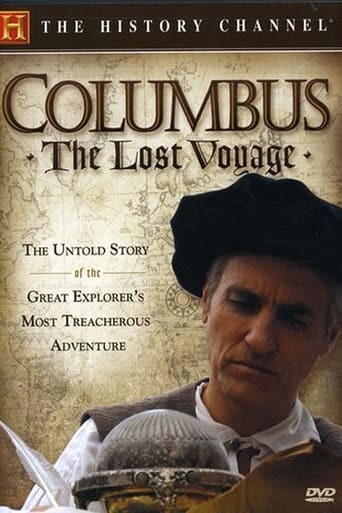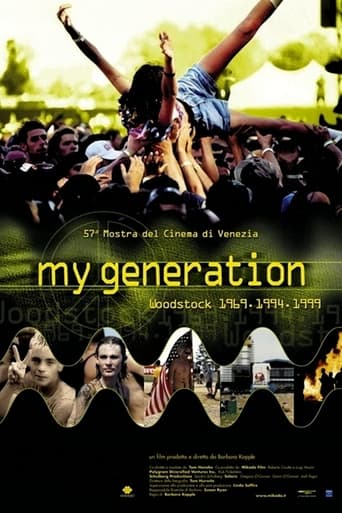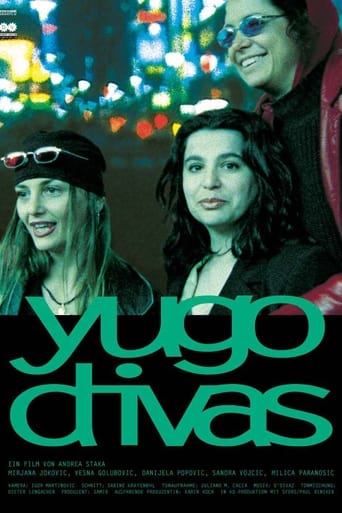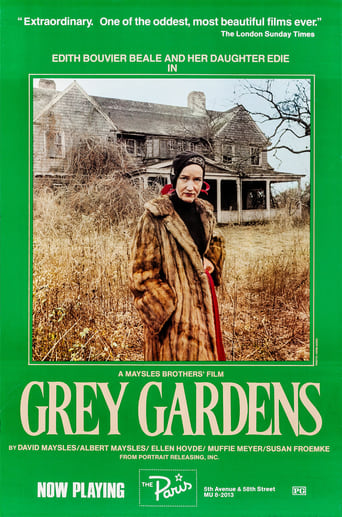
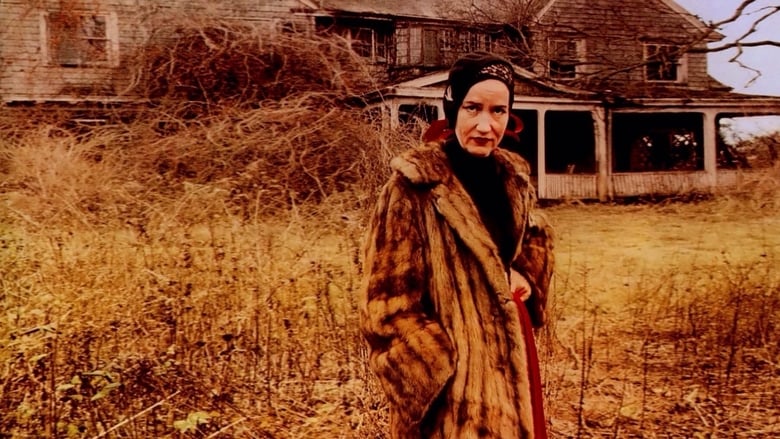
Grey Gardens (1976)
Edie Bouvier Beale and her mother, Edith, two aging, eccentric relatives of Jackie Kennedy Onassis, are the sole inhabitants of a Long Island estate. The women reveal themselves to be misfits with outsized, engaging personalities. Much of the conversation is centered on their pasts, as mother and daughter now rarely leave home.
Watch Trailer
Cast


Similar titles
Reviews
The story of Grey Gardens, a huge estate in Southhampton, Long Island was home to eccentrics Big Edith Bouvier Beale and her daughter Little Edith. They live there with their cats and raccoons as well. Their home is in disarray after years of neglect. The documentary about Big Edie and Little Edie is a rare look into humanity. The mother and daughter are quite unique, talented and individualistic in their lives. When the film director agreed to make a movie about them, they couldn't have imagined the outpouring and interest in the Beales. They are related to former First Lady, Jacqueline Kennedy Onassis. They were both debutantes and figures in New York high society. This rare look at their lives offers a glimpse into their world. We may not understand their decisions and choices but we respect them for their candidness and honesty throughout.
The illustrious apotheosis of "direct cinema" in the documentary trend, Maysles Brothers' GREY GARDEN (Hovde and Meyer received co-directing credit for their brilliant editing work), thrusts squarely into Big Edie and Little Edie's life in the titular, dilapidated residence in East Hampton. The relatively schematic newspaper articles give viewers bare-bones information of these two women, relatives of Jackie O, symbol of the detritus of old money, choose an eccentrically reclusive life behind the overlaying verdancy.Their quotidian activities encompass bickering, prating, sun-bathing on the terrace, eating can food (feeding cats and other feral inhabitants), dancing and singing to the old tunes, lamenting over their halcyon days, of which we can step by step get an overall picture by garnering from their sporadic conversations and soliloquies whereas their scuzzy living conditions continue to appall us as a side-note. Singing is Big Edie's passion, edging 80, she still can belt out enchanting oldies albeit her bedridden inconvenience. Little Edie, at the age of 57, conversely is much more agile, who seemly conjures up an effervescent persona on camera (that's cinema, whenever you are camera-ready, it defects from reality), dazzles us with her parade of head-scarfs and other get-ups, emits a convivial energy field around her notwithstanding the pestering grouse about a marriage she could never have, which adds up sympathy to the fact that she has never managed to live a life she pines for, a spinster who ostensibly sacrifices her personal life to be the caretaker of her aging mother, although the film never plies us with more data of their past apart from what they babble away incessantly on a daily base. This creates a tinge gnawing feel, there must be grounds behind the duo's decision to carry on their decaying pattern of living, but why? Financial hurdles, mental nonchalance or it is just an inexorable process of accepting the status quo and laissez-faire (they are blessed to have fortune which is able to provide for a care-free living inside a mansion)? And what is so formidably threatening outside Grey Gardens that obstructs them from going out and severs almost all the contact from the rest of the world? That is the core question, alas, we never find a satisfactory answer from this intimate portraiture. Big Edie is obviously hobbled by her physical state, but what about Little Edie? She would sell the property after her mother's demise (in 1977) and embark on a new life (she died in 2002 at the age of 84), so what is her excuse of this self-imposed shut-in with her mother? Is their secluded status is mythified by design to gain a news-worthy appeal? One cannot help but speculate in the absence of further material of their story. Of course, the film is a hallmark of documentary filmmaking which is meritoriously devoid of any suspicion of editorializing or exterior POVS, no spoon-feeding or emotion-manipulation, viewers can completely construct their own perspectives through those fragments of real life presented and conflated by the filmmakers, it is the closest "unadulterated truth" we can obtain from the medium of cinema. More heartwarming is that while sustain a dispassionate viewpoint, Maysles brothers show judicious protection over their subjects, however kooky they are, and unhealthy their relationship is, the daughter-and-mother pair deserve our respect, because they are courageous enough to open up, and reveal to us what humans are made up.
An old mother and her middle-aged daughter, the aunt and cousin of Jacqueline Kennedy Onassis, live their eccentric lives in a filthy, decaying mansion in East Hampton.Plenty has been written and said about the Kennedy family, and Irish political dynasties, but far less is out there about the Bouvier (?) family... and these odd black sheep of the family make me want to know more. I had never heard of them. How is that possible? This documentary has been floating around for forty years, and is really mandatory viewing for anyone who is interested in either Kennedy, the Hamptons or mental illness."Big Edie" died in 1977 and "Little Edie" sold the house in 1979 for $220,000 to Sally Quinn and her husband, former Washington Post editor Ben Bradlee,[7] who promised to restore the dilapidated structure (the sale agreement forbade razing the house). "Little Edie" died in Florida in 2002 at the age of 84. According to a 2003 article in Town & Country, after their purchase, Quinn and Bradlee completely restored the house and grounds.
In SALESMAN, we saw traveling salesmen going door to door peddling copies of The Big Book of Jewish Fairy Tales (as comedians Bill Maher, Jon Stewart and Lewis Black call the bible); in GREY GARDENS, we see the Rich as they slowly rot away in their crumbling castles. This is rot as seen from the Inside. No, not "rot," per se; rather, DECOMPOSITION: slow dissolution. Slow decay, on full display. "You shouldn't have a contact with The Outside World," "Big Edie" warns her mostly bed-ridden mother before pirouetting around the house like the young child she proclaims herself to be (her obsession with her looks and her weight aren't necessarily strange, but this self-proclaimed "eternal youth" is). GREY GARDENS is often difficult to watch, simply because there's not a lot going on- and, if not for the family name, it's unlikely anyone would've EVER heard of these two recluses. I wasn't particularly moved by it, but I'm sure the late Shirley Jackson would've understood.


